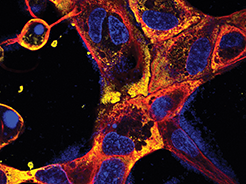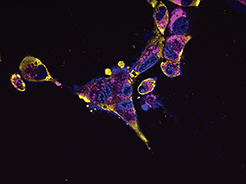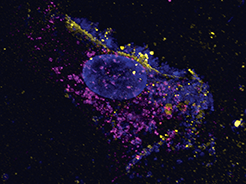Researchers across the College of Veterinary Medicine have been engaged in high-impact projects in response to the COVID-19 pandemic for months now.
The projects range from developing a vaccine to evaluating therapeutic drugs and creating a new testing system.
Iowa State University’s Office of the Vice President for Research created a research seed grant program to fund high-risk, high-reward projects related to COVID-19 that can be rapidly pursued for up to six months. Of the seven projects funded, five featured CVM faculty members.
A small sampling of the COVID-19 research projects currently underway include:
- Dr. Cathy Miller, interim chair of the Department of Veterinary Microbiology and Preventive Medicine, is working to identify antiviral drugs that disturb the structure of the viral RNA genome to determine ways to slow down its replication in human hosts. Her research team hopes to find drugs capable of binding specifically to the virus genome, altering its ability to replicate.
- Dr. Michael Cho, professor of biomedical sciences, is looking to find a way to prevent the COVID-19 virus entirely by creating a protective vaccine. He plans to develop a vaccine based on the receptor binding domain of SARS-CoV-2.
- Dr. David Verhoeven, assistant professor of veterinary microbiology and preventive medicine, is part of a team developing a novel, human-relevant 3D in vitro model of co-cultured human respiratory systems cells to mimic the respiratory tract more accurately. The model will be used to screen COVID-19 drug candidates before they are used on human patients.
- Verhoeven is also on a team that includes Dr. Karin Allenspach, professor of veterinary clinical sciences; Dr. Jonathan Mochel, associate professor of biomedical sciences and veterinary diagnostic and production animal medicine; and Dr. Bailey Arruda, associate professor of veterinary diagnostic and production animal medicine.
- The team is looking to better understand a possible spillover of the virus to other species including livestock species in the United States, particularly swine.
- Verhoeven and Dr. Michael Wannemuehler, professor of veterinary microbiology and preventive medicine, are also part of a research group that is evaluating the antiviral activity of a novel nanomedicine.
- Wannemuehler and Dr. Al Jergens, professor of veterinary clinical sciences, are investigating ways to ensure that once a COVID-19 vaccine is ready it can be as effective as possible. The group is pursuing a method to combine experimental data with machine-learning modeling to identify specific host and microbial genes, and the projects they encode, that may boost or suppress host immunity.
- Dr. Jianqiang Zhang, associate professor of veterinary diagnostic and production animal medicine, is examining better avenues for COVID-19 testing using a similar system currently used for alcohol breath tests. His team plans to collect virus particles directly from exhaled breath and the finished product will be a handheld breathalyzer with a response time of less than seven minutes and at a cost of less than $1 per test.
- Dr. Radford Davis, associate professor of veterinary microbiology and preventive medicine, and Dr. June Olds, clinical assistant professor of veterinary clinical sciences, will conduct a survey of Iowa bats to evaluate the similarities of coronavirus found in bats to those in other animals and humans.
- Dr. Chandru Charavaryamath, assistant professor of biomedical sciences, is looking at the factors that might increase an individual’s susceptibility to COVID-19 infection.
- Dr. Bryan Bellaire, associate professor of veterinary microbiology and preventive medicine, is testing antivirals against SARS-COV2 exploring the application of nanomedicines to prevent the competition of the coronavirus’ life cycle in cultured cells.
- Bellaire is also collaborating with many of these and other projects being conducted at Iowa State. Bellaire manages the college’s BSL3 lab, the only BSL3 lab on campus.



Photos: Dr. Bryan Bellaire
